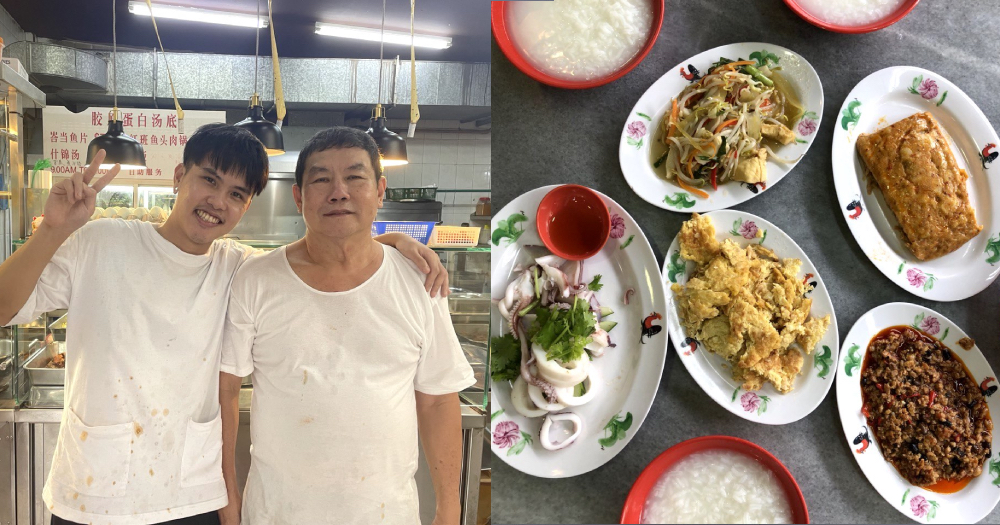Follow us on Telegram for the latest updates: https://t.me/mothershipsg
When I arrived at White House Teochew Porridge at 4pm on a Wednesday afternoon, Darryl Peh, 27, was making a cup of kopi-o for a customer.
Preparing beverages for customers was among the many things Peh had to learn as a young hawker and entrepreneur behind mookata stall Black Pig.
But Peh's story is not just about grit and resilience; it's also about learning to let go of his own venture to keep his family's business of Teochew porridge going.
Selling Teochew porridge since 1997
In May 2022, Peh decided to take over the Teochew porridge family business that his father had been running for decades.
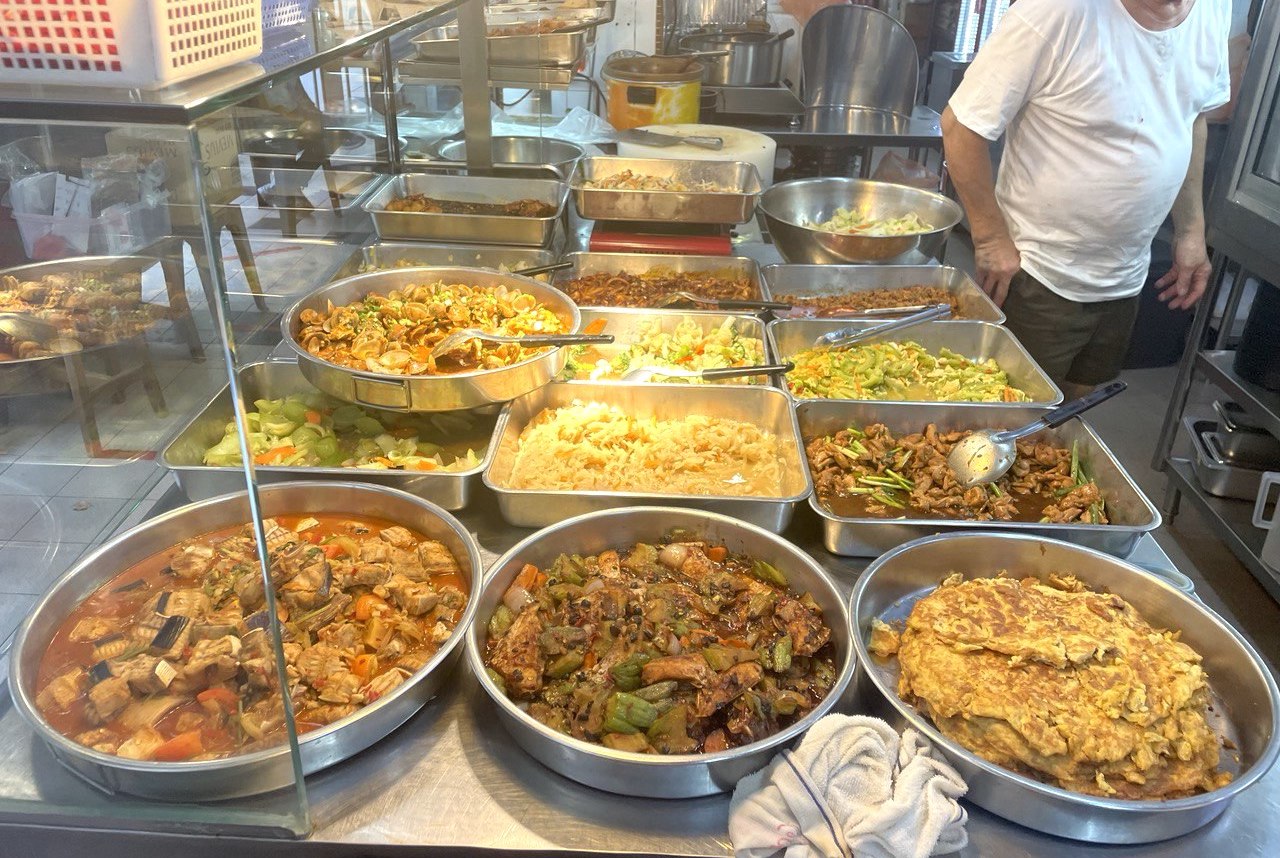 Photo by Karen Lui.
Photo by Karen Lui.
Prior to this decision, Peh had been running two F&B businesses—Black Pig, and Yakiniku by Black Pig—for over a year.
Peh's father started Soon Soon Teochew Porridge in early 1997 in Serangoon before moving the business to Kovan in 2007.
He then sold the business in August 2018 as he wanted to retire.
However, a month of retirement, the elder Peh became restless and eventually returned to the industry, opening a new eatery at its current location under the name White House Teochew Porridge in October 2018.
For three months between October 2020 to January 2021, the eatery was closed as Peh's father was recovering from knee surgery.
He continued to pay rent on time and the workers were given paid leave.
 Peh's father during his recovery in November 2020. Photo by White House Teochew Porridge's Facebook page.
Peh's father during his recovery in November 2020. Photo by White House Teochew Porridge's Facebook page.
In early February 2021, the Teochew porridge was available only for the lunch hour and Black Pig started operating in the evening on the same premises.
Peh started Black Pig as a way to help alleviate the physical and financial stress on their father, who was running the porridge business with some help from a Malaysian employee.
However, in 2021, the eatery underwent a series of closures and reopening due to Covid-19, and even a change of menu to fish soup and duck rice before they decided to bring Teochew porridge back in February 2022.
Peh told us,
"Actually, everyone who has tried our porridge will most likely stay with us. It's just because of our repeated closures and reopenings, and the changes to the menu like duck rice, fish soup, and mookata, which caused us to lose a lot of our customers."
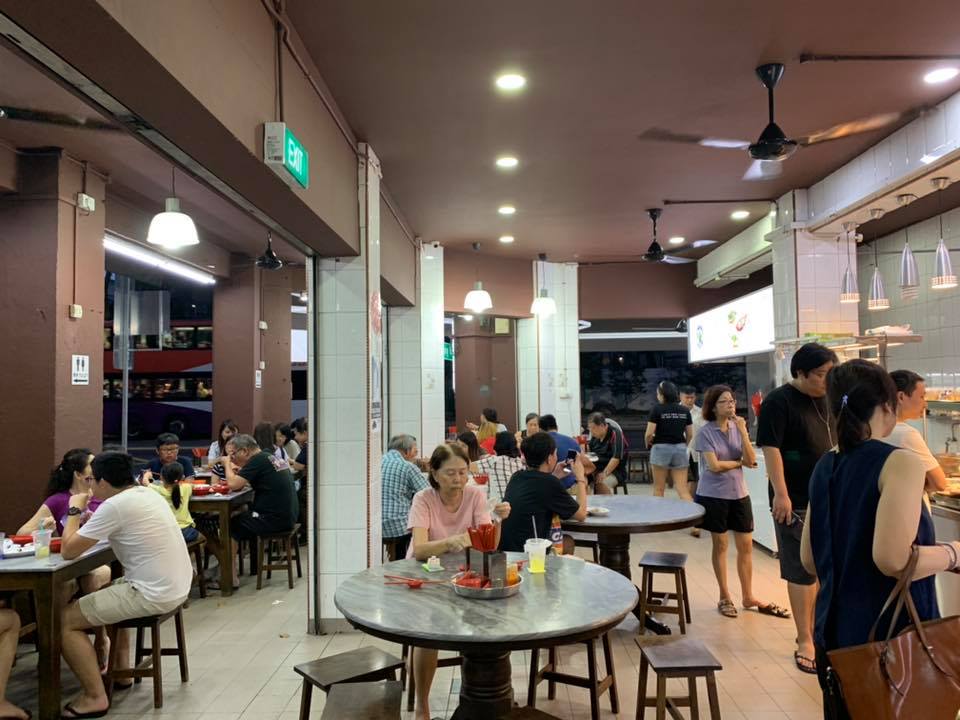 April 2019. Photo from White House Teochew Porridge's Facebook page.
April 2019. Photo from White House Teochew Porridge's Facebook page.
In end May 2022, his father's trusty employee left, and Peh was abruptly faced with the dilemma of taking over his father's business or continuing his mookata and Japanese food businesses — a decision he had to make within a few days.
"I wasn't even sure if I can do it or not. It was a gamble, to be honest. A huge gamble."
Arriving at the decision to take over
So, why didn't Peh simply take over the porridge business in the first place, instead of dabbling in mookata?
"I kept thinking that [learning] this takes years. Everyone makes it sound so difficult. You know, in Japan, you have to wash rice for three years then you can start doing more? I'd started to think that I'd take at least one year or even two or three years before I could take over.
I thought to myself, if I take one to three years to learn this, then what if I don't like it? It's a waste of my time. I'm the type of person who doesn't like to waste time."
Besides his fear of potentially "throwing three years of his life away," Peh expressed his concern about the lack of work-life balance in this line of work.
He had actually considered taking over when he helped out at the stall as a teenager, but gave up due to the difficulties he experienced back then.
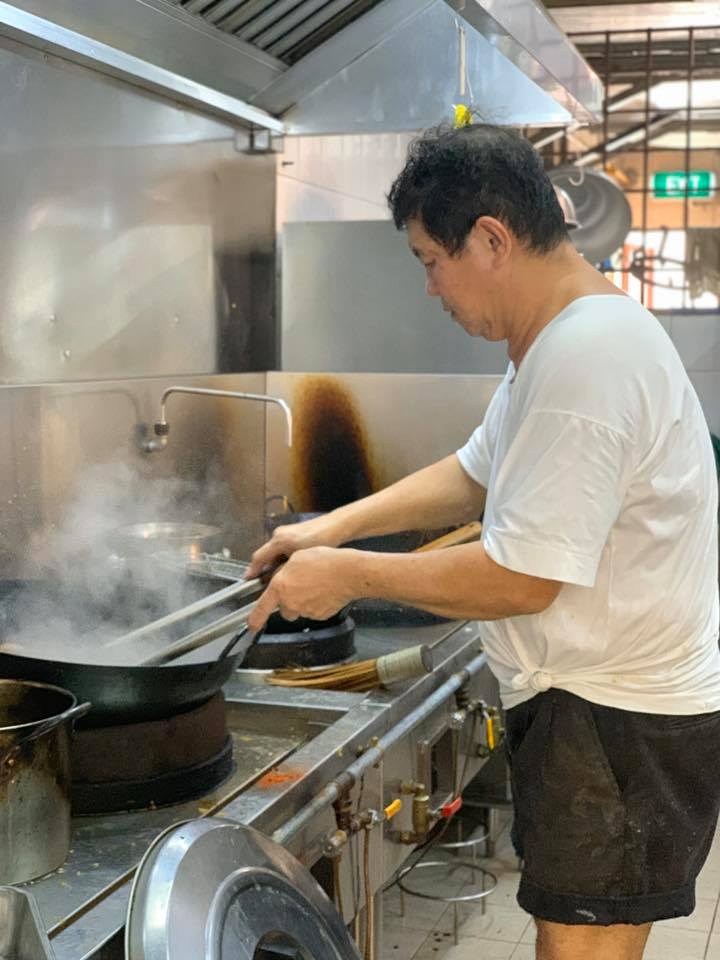 Peh's father. Photo from White House Teochew Porridge's Facebook page.
Peh's father. Photo from White House Teochew Porridge's Facebook page.
Peh also said that the business at the mookata stall was "actually not bad," which resulted in their subsequent opening of the Japanese stall in Jurong where he had two employees.
But besides his father's health condition, there were also driving factors that eventually led Peh to give up on his mookata and Japanese food businesses to take over the Teochew porridge family business: the loss of an important employee.
Peh shared that White House Teochew Porridge used to have a Malaysian employee who was "very hardworking" and did a lot of things, including helping him with the mookata business.
She quit at the last minute as she had not returned to Malaysia in the past two to three years and wanted to take a break.
"When she went back, this place became short-staffed," Peh said.
"I mean we were already short-staffed. With her gone, it was very jialat (bad) ... I can't pangseh (abandon) my father."
The closure of Ah Seah Teochew Porridge was also another factor.
"I saw it as an opportunity," Peh revealed candidly.
"There are not many Teochew porridge stalls left now, especially those that are family-run. So, I thought to myself, why not try to cook? After all, I have the basic foundation from running Black Pig."
Peh also pointed out that Ah Seah was located close by and he recognised that after the closure, their customers might be looking for a new porridge place to visit.
His own business endeavours has also contributed to arriving at the decision.
"Without Black Pig, I don't think I would be able to take over the porridge business," he said, "because I would not be able to differentiate between the sauces, MSG, etc."
But running a Teochew porridge business is definitely different.
For one, it's more expensive than maintaining a mookata stall, Peh confirmed.
"If we got no business, we throw away everything. For mookata, I can freeze it for two to three days. Usually, it'll be sold within two days and we receive a fresh stock of frozen meat. Teochew porridge is different. I cannot keep. If I keep, the colour will be different and the taste will also be slightly different."
He also highlighted the labour-intensive nature of the Teochew porridge compared to mookata, where the customers are essentially cooking for themselves.
"If you can do well in mookata, the profits are not bad. You also lose less. The gamble is higher for Teochew porridge... As long as we can continue cooking and give customers good food, I think that's all [that] matters. When I cook and see them finish their food, it gives me a sense of satisfaction."
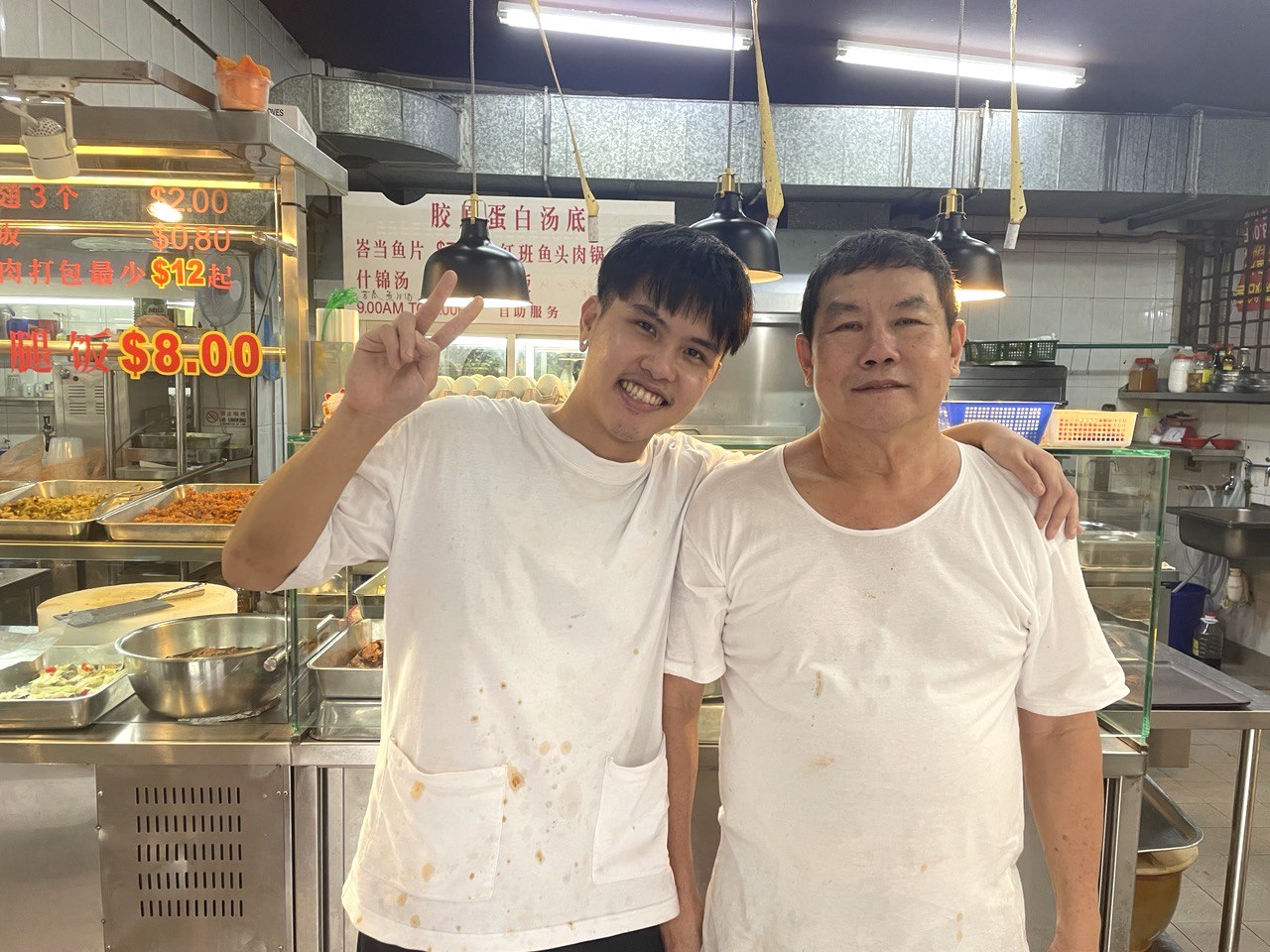 Peh and his father. Photo by Karen Lui.
Peh and his father. Photo by Karen Lui.
Challenges of being a young hawker
After speaking with his friend who is also in the F&B industry, Peh realised that it would be quite "satki" (cool) if he could learn from his father and keep both the family business and the hawker culture alive as a young hawker.
However, he's also faced his fair share of cynics.
Due to his young age and boyish appearance, customers often expressed their doubt about his ability to hit the standards of his father.
Peh revealed the negative comments he received from one of the uncles who frequented the Jurong West coffee shop where his Japanese food stall was located at:
"He would say things like, 'Young chap, your business won't succeed here,' or 'It looks like no one is patronising your stall,' even if my sales are performing well. He would also ask me, 'You're so young, can you really cook?' If people keep saying things like that, how will anyone dare to be a hawker?"
Fortunately, the other stall vendors were very friendly and would tell him not to listen to such negative comments that bring him down, Peh said.
At the time of our conversation, Peh has been cooking at the Teochew porridge eatery for about three weeks.
While he said all the dishes were difficult to learn, he identified the cai po neng (preserved radish omelette) and handmade fishcake as the two dishes he struggled with the most.
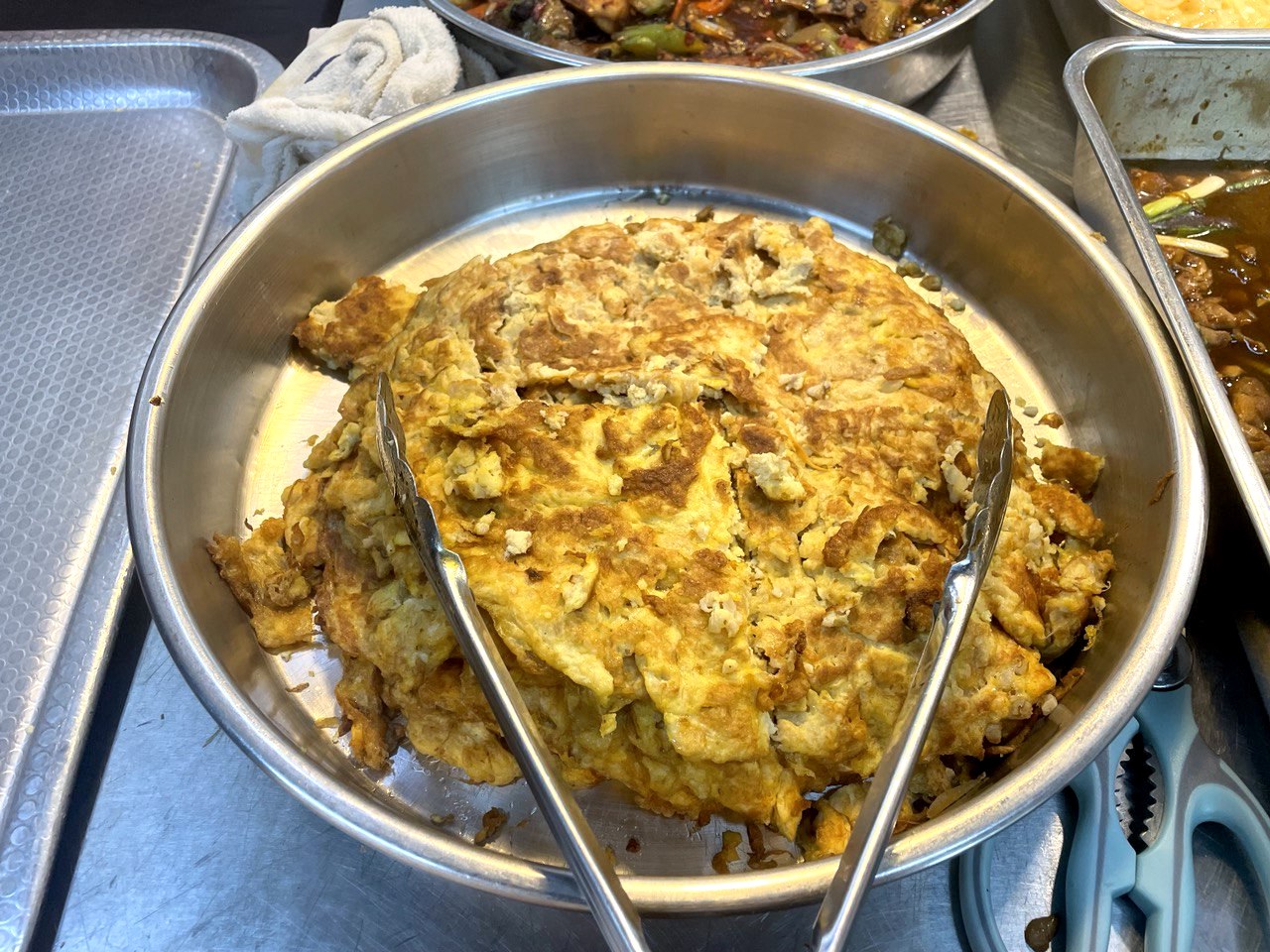 Cai po neng (preserved radish omelette). Photo by Karen Lui.
Cai po neng (preserved radish omelette). Photo by Karen Lui.
He took me through the steps of cooking the preserved radish omelette, which involves a series of fast motions, including flipping the mixture of eight to nine eggs, turning the wok, flattening the eggs due to the intensity of the flame.
"I could flip the eggs once in the first week but I kept burning it."
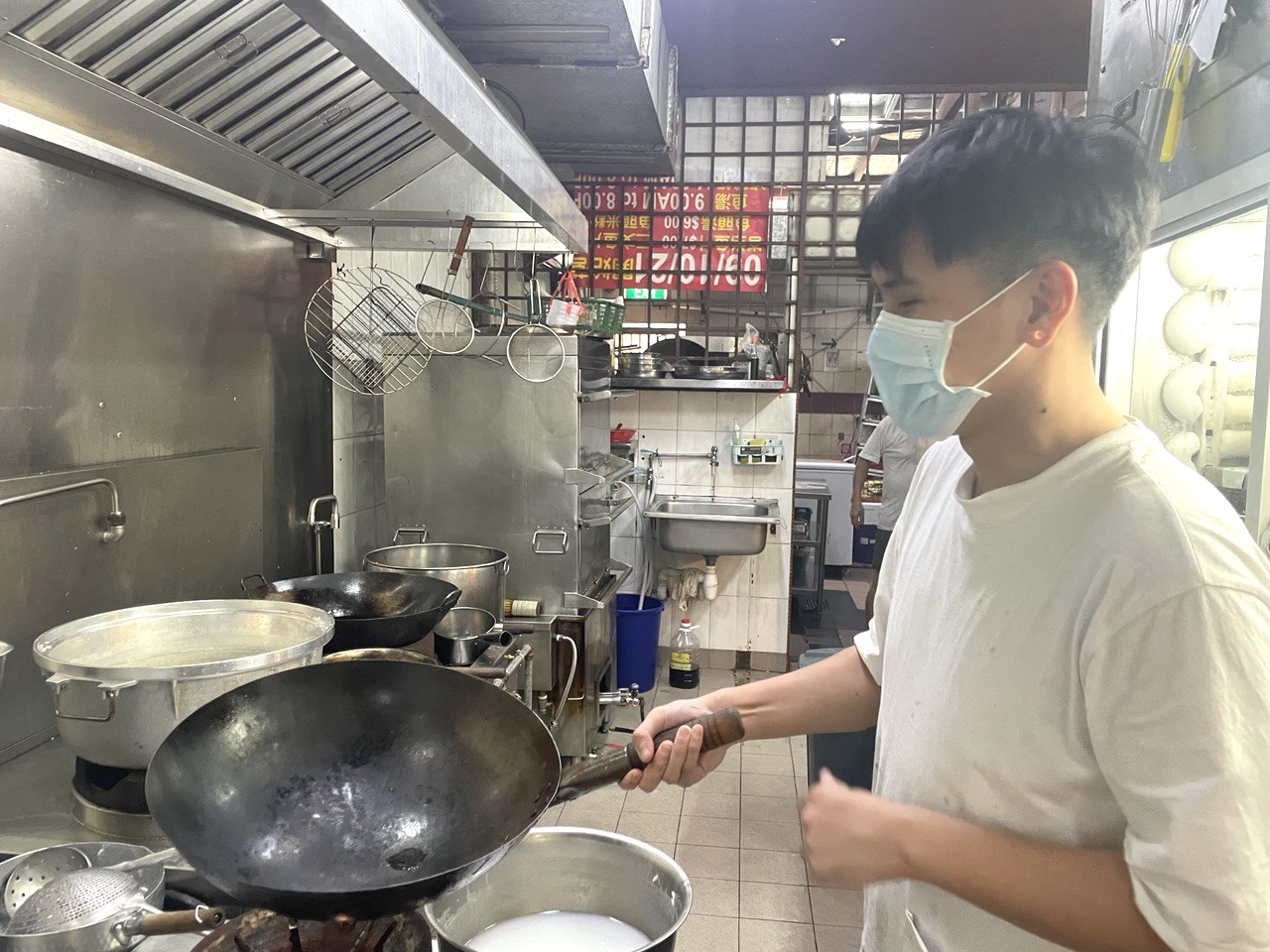 Peh reenacting the way he flips the omelette in the wok. Photo by Karen Lui.
Peh reenacting the way he flips the omelette in the wok. Photo by Karen Lui.
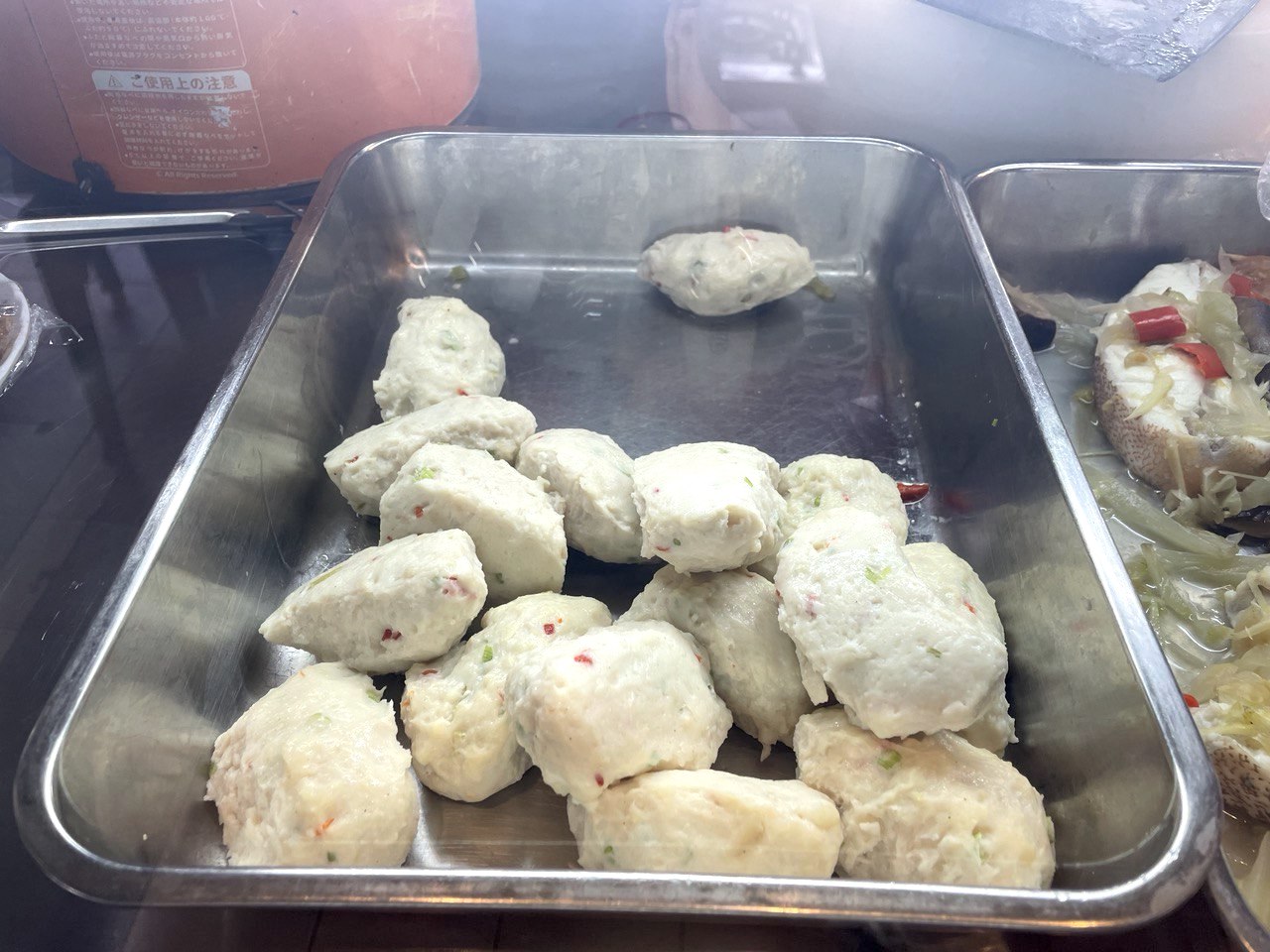 Handmade fishcakes. Photo by Karen Lui.
Handmade fishcakes. Photo by Karen Lui.
Dad is happy about the takeover
In between the lunch and dinner hours, Peh's father found some time to join us in the middle of the interview.
I had to ask how the elder Peh would rate his son's cooking, and his experience of teaching Peh.
Addressing the taste of Peh's cooking, his father replied, "Not bad (不错), the customers said can lah (可以啦)."
But the older and more experienced cook can still come across as a harsh critic.
Without mincing his words, he gave Peh a score of five out of ten, explaining that he had to dock points over the fact that his son doesn't prep the ingredients all the time.
Earlier, Peh had admitted that he doesn't go to the market to buy the ingredients in the morning, a chore that his father continues to do.
The young hawker either reaches the eatery at around 7am to help with prep, or at 9am to start the cooking and be on standby at the drinks stall.
The elder Peh said the experience of teaching his son was "okay lah", as long as he didn't stand next to Peh as the latter would get annoyed—something that the younger Peh concurred.
Peh immediately reminded his father that the latter had complimented him on the bitter gourd he cooked that afternoon, saying it was "very appetising (很美)."
Like most fathers, the elder Peh was quick to admonish his son for being too "hao lian (show off)".
While his father might seem strict, Peh also shared about how his father shows support and encouragement in his own way, which might explain why Peh's confidence remains high.
The casual batter between father and son continued throughout the interview, with the elder Peh even asking his son not to interrupt at one point.
When I asked his father about how he felt about Peh's decision to take over the business, the younger Peh immediately cut in and said with a grin, "He's very happy, my older sister had told me."
The older man calmly replied, "Of course, I'm happy if he wants to do it. If not, I was planning to give it away to someone else."
He explained that he no longer had the physical strength to continue doing this, especially after over 50 years.
"I want to rest for the next 10 years, or else I'd have a lot of regrets," he said with a laugh, adding that he had spent a lot of money on his health, as well as on keeping the porridge business afloat during the Covid-19 pandemic.
"I told him if he wanted to [take over the family business], close the other F&B businesses. Forget about the losses, focus on one location. It's difficult to hire employees. I told him, 'Why not close the Japanese stall in Jurong? Bring your employees over. If not, it's very tiring for me to do it on my own.'"
While Peh's father still drops by the eatery every day, he has stopped cooking shortly after Peh took over.
Instead, he watches over Peh and the workers, and occasionally gives feedback to help them improve.
Cai png vs Teochew porridge
Fundamentally, both Teochew porridge and cai png involve picking a number of side dishes to pair with your rice or porridge.
There are also some overlaps between the side dishes offered at Teochew porridge and cai png stalls.
So, what sets Teochew porridge apart from cai png?
According to the younger Peh, cai png has more of an emphasis on being affordable and economical: "They are called economic rice for a reason, they need to sell [it] cheap."
In order to keep costs low and be able to offer low prices to customers, most cai png stalls are not able to use fresh and high-quality ingredients, he said.
On the other hand, Teochew porridge typically uses fresh, higher quality ingredients to pair with porridge.
He elaborated about how his father has been waking up at 5am and going to the market in Serangoon every morning to personally pick out fresh ingredients.
The menu for each day is not exactly the same as it depends on which produce at the market "look nice" to his father, Peh said.
Then, the elder Peh would arrive at the eatery at around 6am to start the prep work.
To maintain the high quality of their food, they also do not cook everything at once and throw away the food if they are sold within a certain time frame.
"Do you know why we cook two times [a day]? You would think it's easier to cook in the morning and leave the food there and just make it hot. It's to maintain the quality.
Whatever we cannot sell during the noon, we throw away. The food for dinner is freshly prepared. I've asked my dad why [we] don't donate the food. He replied that the people might get food poisoning."
Peh pointed out that this is another aspect that sets Teochew porridge from cai png whereby the food is typically warmed the leftover dishes from the noon to sell in the evening.
"Those who are familiar with it can taste the difference, those who aren't, can't (会吃的人吃得到,不会吃的人吃不到). If you're just looking to fill your stomach, go for cai png."
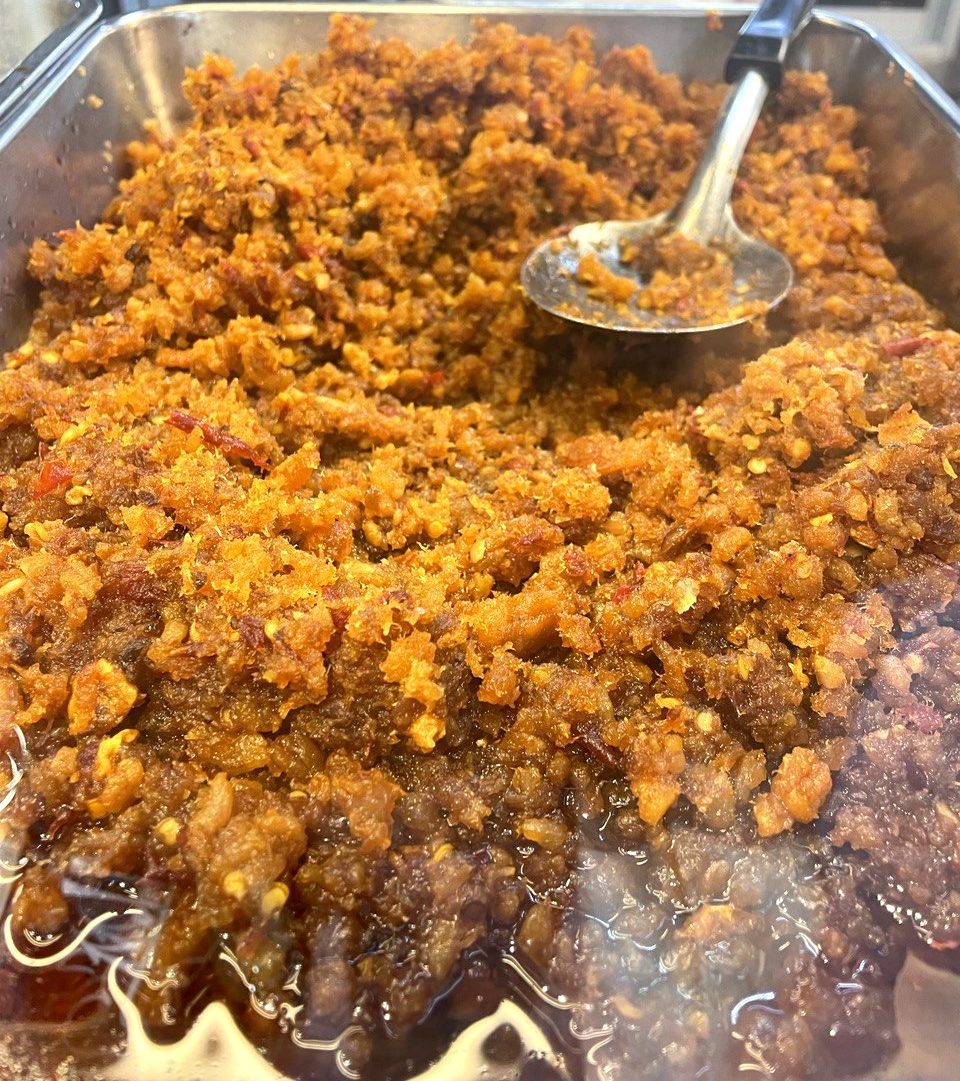 One of their bestsellers, the hae bee hiam (spicy dried shrimp sambal) is not too spicy and has a generous amount of dried prawn. Photo by Karen Lui.
One of their bestsellers, the hae bee hiam (spicy dried shrimp sambal) is not too spicy and has a generous amount of dried prawn. Photo by Karen Lui.
Their dedication to serving fresh, high-quality ingredients is reflected in the prices that sometimes become a point of friction with some customers who are unable to understand it.
Peh has even asked his father about the pricing to find out if their prices were reasonable.
He found his father's explanation and breakdown of the cost price, selling price, and how the profits are distributed to expenses such as rent, utilities, employees' pay, etc. to be "logical".
"I just feel very sian (tired), I see these people, they make a lot of noise but they don't understand. You got to be in this industry to understand. But, I also don't blame them."
He added that most people are not aware of how much the ingredients cost unless they go to the markets.
"You get what you pay for (一分钱一分货). People here are very funny, they would complain, 'So expensive!' but they still come back to eat.'"
Addressing the same topic, Peh's father's response focused more on the curation of dishes:
"Teochew porridge isn't very complicated. You just need to understand the logic. It needs to be fresh, light, not too oily. The porridge can't be too mushy, Teochew people prefer it more grainy rather than mushy. If you anyhow cook and sell everything, then it becomes chap cai png."
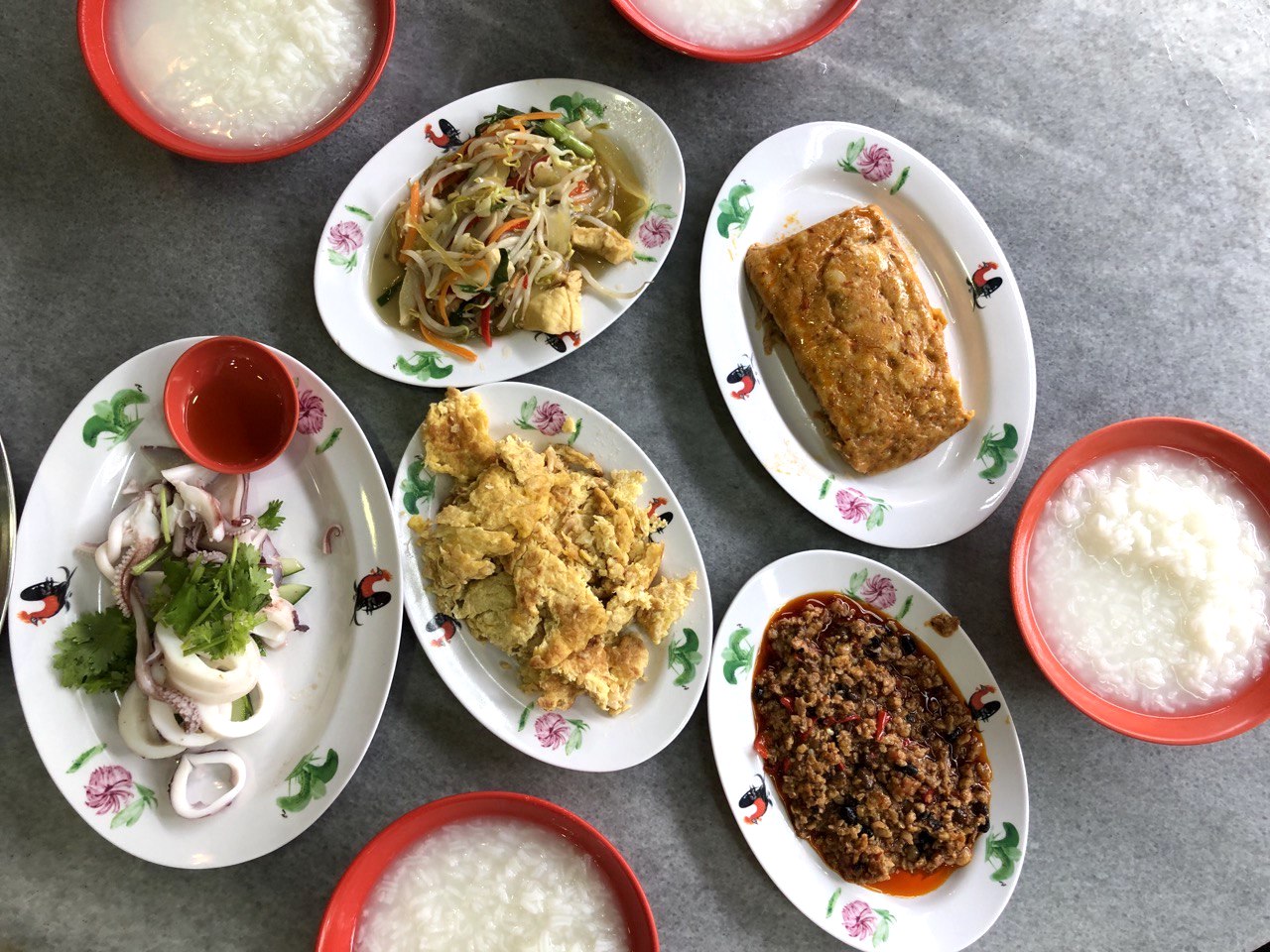 We paid S$24.80 in total for this meal for four. No, it was not sponsored. Photo by Mandy How.
We paid S$24.80 in total for this meal for four. No, it was not sponsored. Photo by Mandy How.
At this moment, a lady approached our table and asked Peh's father excitedly if he was doing an interview and remarked pointedly about why he did not dress up for the occasion.
The elder Peh appeared a little embarrassed by the unexpected interruption and told her we were discussing "serious stuff", to which she casually replied with a laugh, "Very serious meh?"
Peh interjected with a grin, "Very formal hor, my dad?"
Peh's father appeared to be mildly annoyed by the interruption, explaining that he was worried that I might feel disrespected and it might adversely affect my work here, to which both Peh and I reassured him that it was alright.
I later learnt that the lady was a regular customer, which underlined the close bond that Peh's father has established with his regular customers such that they feel comfortable approaching him for a chat.
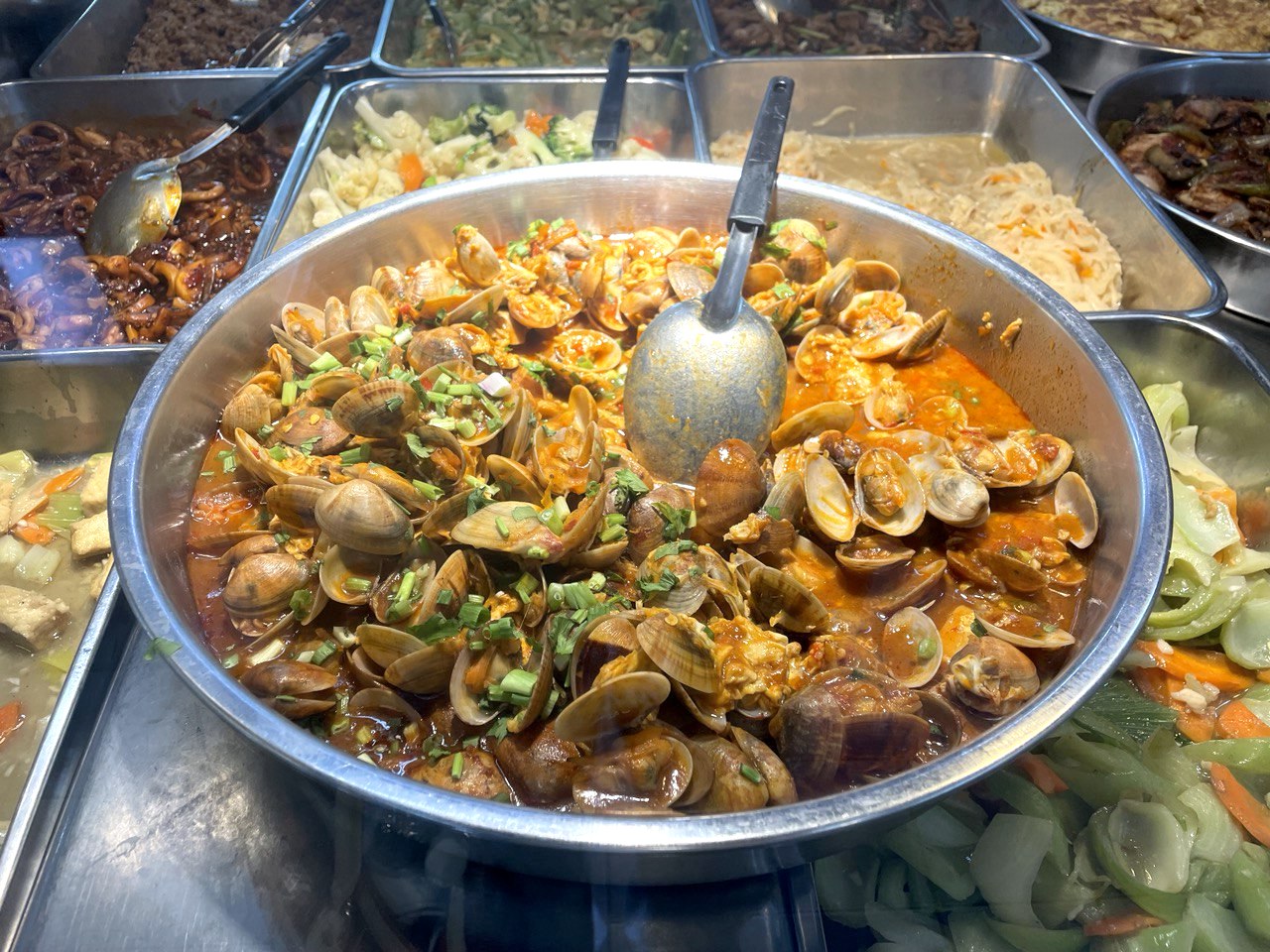 Peh's favourite dish is the lala (clams) in tomato-based sauce. Photo by Karen Lui.
Peh's favourite dish is the lala (clams) in tomato-based sauce. Photo by Karen Lui.
White House Teochew Porridge
Address: 1096 Serangoon Rd, Singapore 328193
Opening hours:
11am to 8:30pm (or until sold out), daily.
Closed on Thursdays.
Top photos by Karen Lui and Mandy How. Quotes were edited for clarity.
If you like what you read, follow us on Facebook, Instagram, Twitter and Telegram to get the latest updates.
